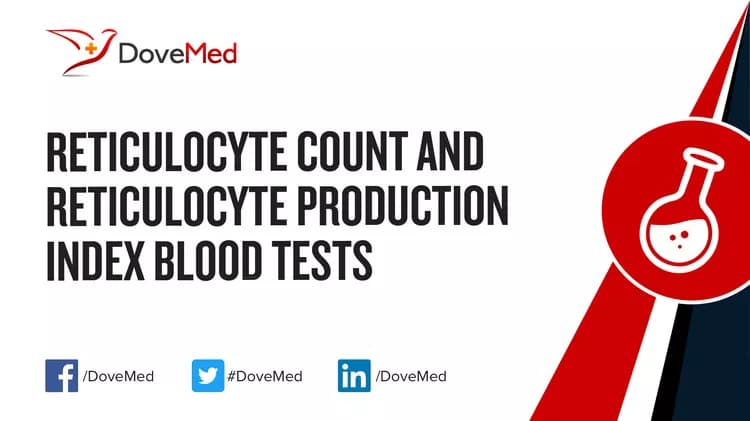
Reticulocyte Count and Reticulocyte Production Index Blood Tests
What are the other Names for this Test? (Equivalent Terms)
- Corrected Reticulocyte Blood Test
- Retic Count Blood Test
- Reticulocyte Count Blood Test
What is Reticulocyte Count and Reticulocyte Production Index Blood Tests? (Background Information)
- Red blood cells (RBCs) are the principle ‘gas’ transport vehicles of the body. They supply tissues with oxygen and carry carbon dioxide away to the lungs, for excretion
- RBC production is called hematopoiesis and this process takes about a week. The first 5 days of process, occurs inside the red bone marrow. During this time, a developing RBC, goes through several immature forms
- The nearly-developed RBC is then released from the bone marrow into the bloodstream at about this time. This nearly-developed RBC is called a reticulocyte. A reticulocyte completes its maturation, while circulating in blood
- When the body is starved for oxygen (a condition termed as hypoxia), it stimulates hematopoiesis to make more oxygen-carrying RBCs. Reticulocytes are released earlier in the development process, and they circulate for a longer period
- The Reticulocyte Count Test is a blood test to measure the level of reticulocytes in bloodstream. It is often reported as a ratio of reticulocytes to mature RBCs
- In an individual, the results from a Reticulocyte Count Test can be compared to reference values, to allow for a better analysis of hematopoiesis. This is called a Reticulocyte Index Test
- The analysis can be enhanced even further by accounting for the level of immaturity of reticulocytes, because of their early release. This is called a Reticulocyte Production Index
What are the Clinical Indications for performing the Reticulocyte Count and Reticulocyte Production Index Blood Tests?
Following are the clinical indications for performing the Reticulocyte Count and Reticulocyte Production Index Blood Tests:
- As a follow-up to a complete blood count (CBC) test
- Fatigue
- Pale appearance (pallor)
- Difficulty adapting to altitude changes
- Monitoring the effects or progression of:
- Chronic blood loss, such as after a trauma
- Burns
- Chronic obstructive pulmonary disease (COPD)
- Bone marrow disorders, such as polycythemia vera
- Kidney, liver, bone marrow disorder
- Bone marrow transplant
- Medications and chemotherapy
How is the Specimen Collected for Reticulocyte Count and Reticulocyte Production Index Blood Tests?
Following is the specimen collection process for Reticulocyte Count and Reticulocyte Production Index Blood Tests:
Sample required: Blood
Process: Insertion of a needle into an arm vein.
Preparation required: No special preparation is needed prior to the test.
What is the Significance of the Reticulocyte Count and Reticulocyte Production Index Blood Tests Result?
The significance of the Reticulocyte Count and Reticulocyte Production Index Blood Tests is explained:
- A high reticulocyte count and reticulocyte production index may indicate:
- Bleeding
- Hemolytic anemia
- Sickle-cell anemia
- Leukemia
- Surgical removal of the spleen
- Erythroblastosis fetalis
- A low reticulocyte count and reticulocyte production index may indicate:
- Iron-deficiency anemia
- Pernicious anemia
- Aplastic anemia
- Vitamin B9 deficiency
- Bone marrow disorder
- Liver disorder or cirrhosis
- Kidney disorder
- Pituitary gland disorder
- Chronic infection
- Radiation therapy
The laboratory test results are NOT to be interpreted as results of a "stand-alone" test. The test results have to be interpreted after correlating with suitable clinical findings and additional supplemental tests/information. Your healthcare providers will explain the meaning of your tests results, based on the overall clinical scenario.
Additional and Relevant Useful Information:
Certain factors interfere with the Reticulocyte Count and Reticulocyte Production Index Blood Tests. These include:
- Exercise
- Stress
- Smoking
- Genetic variations
- High altitudes
- Medications, diuretics
- Hydration status
Certain medications that you may be currently taking may influence the outcome of the test. Hence, it is important to inform your healthcare provider, the complete list of medications (including any herbal supplements) you are currently taking. This will help the healthcare provider interpret your test results more accurately and avoid unnecessary chances of a misdiagnosis.
Related Articles
Test Your Knowledge
Asked by users
Related Centers
Related Specialties
Related Physicians
Related Procedures
Related Resources
Join DoveHubs
and connect with fellow professionals

0 Comments
Please log in to post a comment.